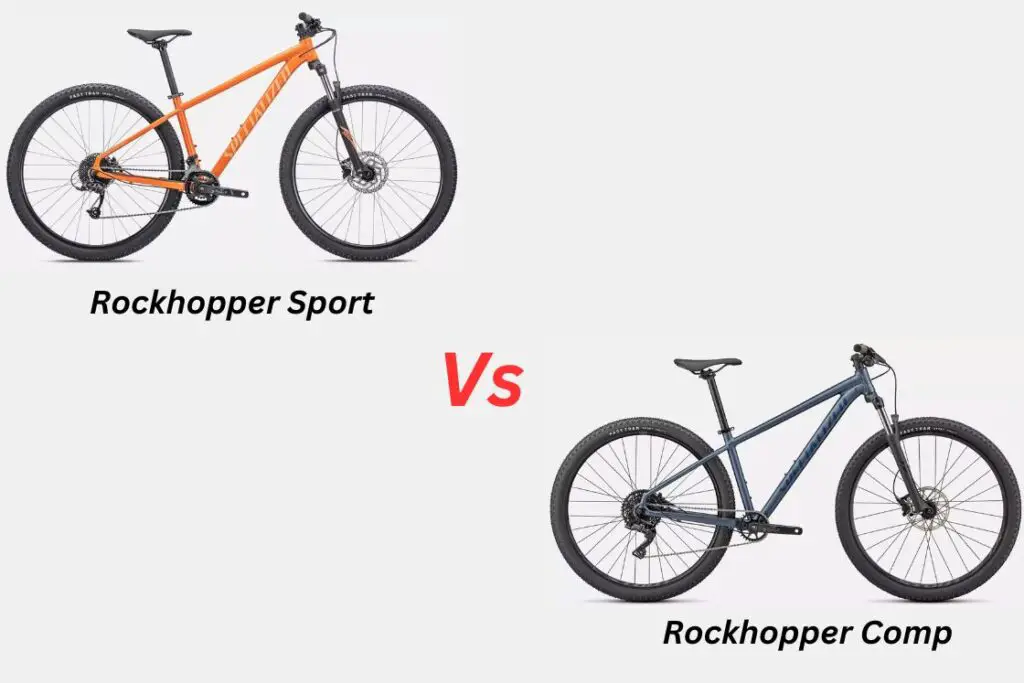
If you are looking for a versatile and reliable mountain bike, you might have come across the Rockhopper Sport and the Rockhopper Comp models from Specialized.
These bikes are designed to handle different types of terrain, from smooth trails to rocky descents, and offer a great balance of performance and affordability. But what are the main differences between them, and which one should you choose?
Here, we will compare the Rockhopper Sport and the Rockhopper Comp in terms of their features, specifications, pros and cons, and price.
Quick Comparison
Here is a table that summarizes the main specifications of the Rockhopper Sport and the Rockhopper Comp:
| Specification | Rockhopper Sport | Rockhopper Comp |
|---|---|---|
| Frame | A1 Premium Aluminum | A1 Premium Aluminum |
| Fork | SR Suntour XCM 29 | SR Suntour XCR-Air 29 |
| Travel | 80/90/100mm (size-specific) | 80/90/100mm (size-specific) |
| Drivetrain | Shimano Altus/Acera 2×9-speed | Shimano Deore 1×12-speed |
| Crankset | Stout Alloy 36/22T | Stout Alloy 30T |
| Cassette | SunRace 9-speed 11-36T | SunRace 12-speed 11-50T |
| Chain | KMC X9EPT | KMC X12EPT |
| Brakes | Tektro HD-M275 Hydraulic Disc | Tektro HD-M275 Hydraulic Disc |
| Rotors | 160mm front / 160mm rear | 180mm front / 160mm rear |
| Rims | Stout Alloy Double-wall | Stout Alloy Tubeless-ready Double-wall |
| Spokes | Stainless Steel 14g | DT Swiss Industry Stainless Steel |
| Tires | Ground Control Sport 29×2.1″ | Ground Control Sport 29×2.3″ |
| Seatpost | Alloy Micro-adjust 30.9mm | TranzX Dropper Post 30.9mm |
| Saddle | Bridge Sport Steel Rails | Bridge Sport Steel Rails |
| Handlebar | Stout Mini Rise Alloy 10mm Rise | Stout Mini Rise Alloy 10mm Rise |
| Grips | Specialized Trail Grips Lock-on | Specialized Trail Grips Lock-on |
Features
Both the Rockhopper Sport and the Rockhopper Comp share some common features that make them stand out from other mountain bikes in their category. These include:
- A lightweight and durable aluminum frame that is easy to maneuver and maintain.
- A SR Suntour suspension fork that provides 80mm or 100mm of travel (depending on the size) and can be adjusted to suit different riding conditions.
- A Shimano drivetrain that offers smooth and reliable shifting across a wide range of gears.
- Hydraulic disc brakes that deliver powerful and consistent braking performance in any weather.
- A comfortable and ergonomic saddle, handlebar, and grips that enhance your riding comfort and control.
However, there are also some notable differences between the two models that affect their performance and quality.These include:
Drivetrain
The Rockhopper Sport has a 2×9-speed drivetrain, while the Rockhopper Comp has a 1×12-speed drivetrain.
This means that the Rockhopper Comp has more gears to choose from, which can help you tackle steeper climbs and faster descents more easily.
The Rockhopper Comp also has a simpler and lighter drivetrain that requires less maintenance and reduces the risk of chain drops.
Related: Rockhopper 29 vs. Rockhopper Sport 29: Compared
Rims
The Rockhopper Sport has alloy rims with stainless steel spokes, while the Rockhopper Comp has tubeless-ready rims with DT Swiss spokes.
The Rockhopper Comp has stronger and lighter wheels that can handle more abuse and offer better traction and puncture resistance. It also comes with wider tires (2.3 inches vs 2.1 inches) that provide more grip and stability on rough terrain.
Seatpost
The Rockhopper Sport has a standard seatpost, while the Rockhopper Comp has a dropper seatpost.
The Rockhopper Comp allows you to adjust your saddle height on the fly with a remote lever on the handlebar. This can help you optimize your riding position for different situations, such as lowering your center of gravity for downhill sections or raising your saddle for pedaling efficiency.
Pros and Cons
Based on their features and specifications, here are some of the pros and cons of the Rockhopper Sport and the Rockhopper Comp:
Rockhopper Sport
Pros:
- Affordable and accessible for beginners and intermediate riders.
- Smooth and reliable shifting with a wide range of gears.
- Powerful and consistent braking performance with hydraulic disc brakes.
- Comfortable and ergonomic saddle, handlebar, and grips.
Cons:
- Heavier and less efficient drivetrain with more potential for chain drops.
- Less durable and responsive wheels with narrower tires.
- No dropper seatpost for adjusting saddle height on the fly.
Rockhopper Comp
Pros:
- More versatile and capable for advanced riders and challenging terrain.
- Simpler and lighter drivetrain with more gears to choose from.
- Stronger and lighter wheels with wider tires and tubeless-ready rims.
- Dropper seatpost for optimizing riding position for different situations.
Cons:
- More expensive and less accessible for budget-conscious riders.
- Requires more maintenance and care for the drivetrain and wheels.
- Less comfortable saddle for some riders.
Related: Rockhopper Elite vs. Expert: Which One Should You Buy?
Price
The Rockhopper Sport and the Rockhopper Comp have different price points that reflect their features and quality.
The Rockhopper Sport has a suggested retail price of $800, while the Rockhopper Comp has a suggested retail price of $1050.
However, these prices may vary depending on the availability, demand, and discounts offered by different retailers.
Conclusion
The Rockhopper Sport and the Rockhopper Comp are both excellent mountain bikes that offer a great balance of performance and affordability. Though, they have some significant differences that make them suitable for different types of riders and terrain.
The Rockhopper Sport is a more affordable and accessible option that provides smooth and reliable shifting, powerful braking, and comfortable riding.
The Rockhopper Comp is a more versatile and capable option that offers simpler and lighter shifting, stronger and lighter wheels, and a dropper seatpost.
Ultimately, the choice between them depends on your personal preferences, needs, and budget.
